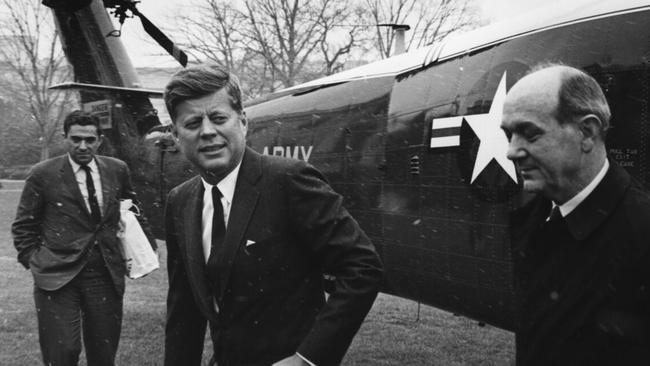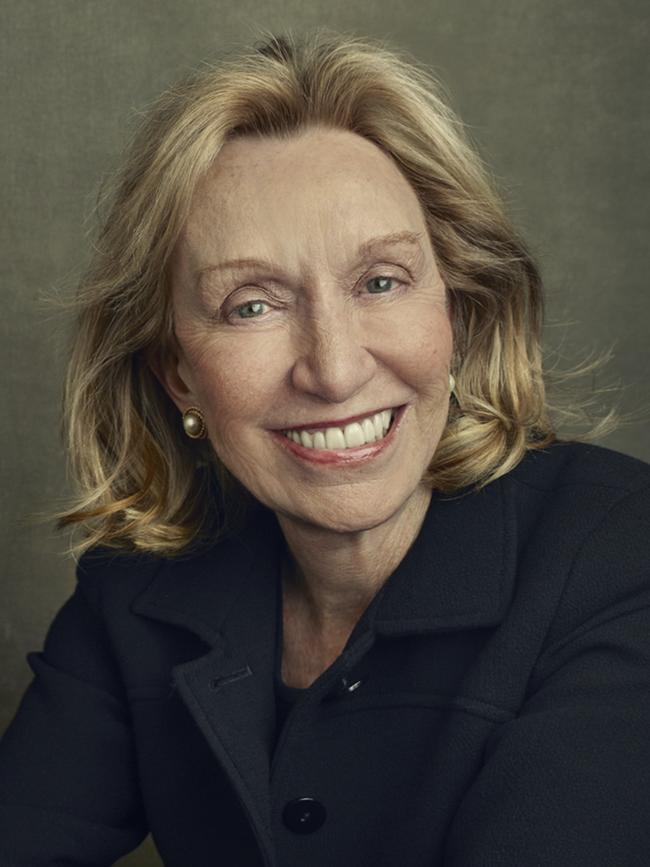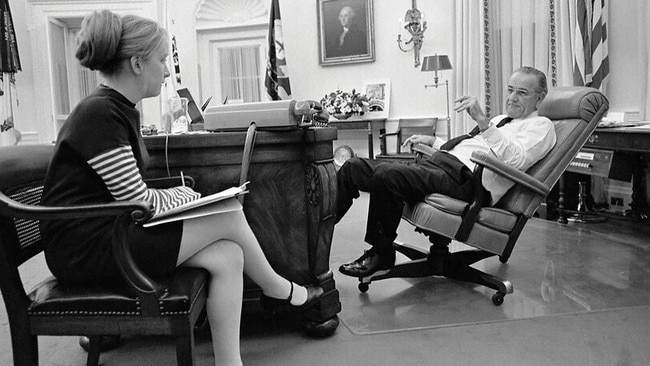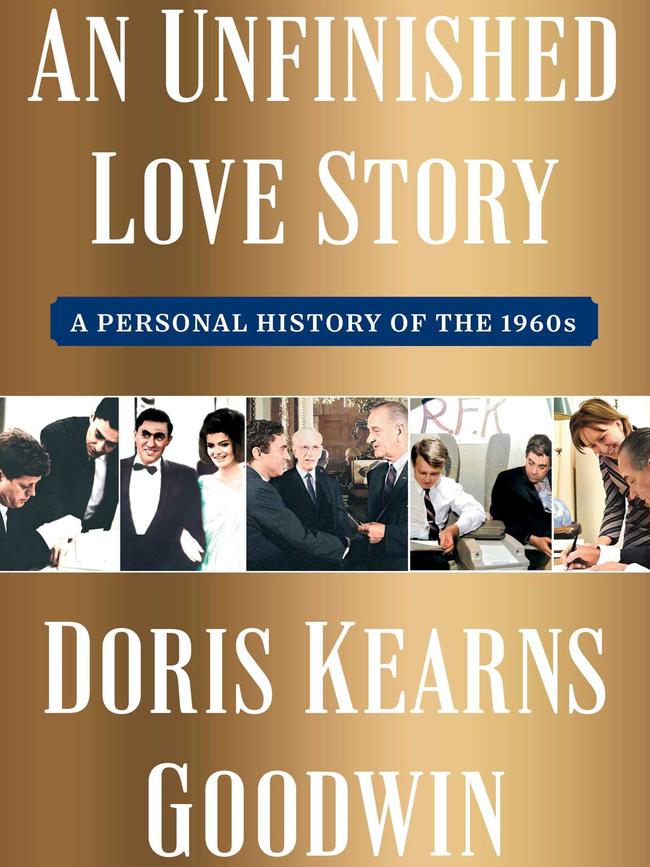Love, death and a clash of presidential loyalties over the tumultuous 1960s
In a new book, historian Doris Kearns Goodwin turns the spotlight on her husband, JFK speechwriter Richard Goodwin.

Now the Pulitzer prize-winning historian has turned the spotlight on her husband, Richard “Dick” Goodwin, who was a speechwriter and adviser to John F. Kennedy and Johnson, alongside their marriage and family life, his death from cancer at age 86 in May 2018, and their long-running dialogue about the tumultuous 1960s.
He was a Kennedy loyalist who reluctantly worked for Johnson, writing his landmark “We Shall Overcome” civil rights speech and helped to craft “the Great Society” agenda. She had been an intern in the Johnson White House and worked with the president on his memoirs at the LBJ Ranch in Texas. He had broken with Johnson, taking to the streets in protest over Vietnam. She remained loyal.
In an exclusive interview with Inquirer, Goodwin, 81, remembers their first meeting at Harvard University in June 1972 and being immediately curious about one another despite “a clash of loyalties” between JFK and LBJ.
They married three years later in December 1975. He was 40; she was 29.

“He was mercurial, brash, arrogant, brilliant and captivating,” Goodwin recalls. “I was excited at the idea of meeting him. He also knew, although he didn’t let on, that I had worked for Johnson after he had left. But I probably knew more about him than he knew about me.”
The new book is a blend of history, memoir and biography. It provides two vantage points on the ’60s and allows the reader to eavesdrop on their conversations while excavating Dick’s 300-plus boxes of archives. They document his time as president of the Harvard Law Review and clerk to Supreme Court Justice Felix Frankfurter, as a congressional investigator who helped uncover the ’50s quiz show scandals, to presidential speechwriter and adviser, writer, teacher and activist.
The ’60s began with the promise of a new generation of leaders and ended with the deaths of the Kennedy brothers and Martin Luther King, a country divided, at war in Vietnam, the retreat of Johnson and the election of Richard M. Nixon. Dick, who also worked for Eugene McCarthy’s failed 1968 presidential campaign, grieved those years. He was reluctant to open the boxes with their mix of “elation” and “loss”.

“When we started our lives together,” Goodwin explains, “I had a much more warm-hearted feeling toward Johnson because of my close experience of having helped him on his memoirs. My feelings toward Johnson remained, even though I had been an anti-war critic, because I understood him.
“But Dick’s feelings about Johnson remained resentful for so many years.
“But as we went through the boxes, and he began to relive the extraordinary times that he had with Johnson and the Civil Rights Act and the Voting Rights Act, and Medicare and Medicaid, and all the social justice programs, his feelings for Johnson that had once been very warm and affectionate returned.
“We had been arguing much of our life, even that first day we met; I was for LBJ and he was for JFK. I kept arguing that Johnson was the one who finished all of the programs that Kennedy might have envisioned and he would argue that it was Kennedy’s inspiration that made them possible. I began to have a greater appreciation of Kennedy and he was able to understand Johnson’s greatness.
“So, I think that argument softened for both of us; we both understood they were two sides of the same coin.
“The inspiration is necessary, but the practical ability to get things done was also necessary. And together their legacy was larger than it was for either one alone.”
Dick had been part of Kennedy’s small campaign team in 1960, writing speeches, preparing briefing papers and prepping him for debates against Nixon. He witnessed Kennedy learn and grow as a politician, and respected his even temperament.
Joining the White House at age 29, Dick went on to play a lead role in the creation of the Peace Corps and Alliance for Progress in Latin America.
“For those who were part of this exhilarating experience of the campaign of 1960, there was a closeness and camaraderie that lasted for the rest of their lives,” Goodwin says.
“There was a 16-year age difference between them. Dick had a somewhat heroic feeling toward Kennedy.
“Kennedy saw that Dick was able to capture his voice. He learned under the tutorial of Ted Sorensen how to write in the style that Kennedy wanted. I think Kennedy could sense that Dick had a passion for politics.
“It wasn’t simply wanting to be a speechwriter; he really wanted to be involved in policy.”
Goodwin writes about an extraordinary meeting Dick had, in secret, with Che Guevara in August 1961. The revolutionary gave him a box of Cuban cigars, which Dick gave to Kennedy. Dick also organised a famous dinner for Nobel prize-winners and worked with Jackie Kennedy to save ancient Egyptian monuments at Abu Simbel. He was known as “a supreme generalist”.
After Kennedy’s assassination in November 1963, Johnson was looking for a speechwriter who could add some “sex” and “music” to his words. Dick was reluctant but eventually was persuaded. He helped draft the Voting Rights Act and the attendant speech to congress – “We Shall Overcome” – in March 1965.
After being summoned to the White House pool to talk with Johnson about his policy agenda, and being enticed into the water alongside the naked president, Dick came up with the phrase “the Great Society” to define the ambitious domestic program that included new funding for education, health, housing, cities, broadcasting, conservation, consumer protection and the arts. Dick provided the words that illustrated Johnson’s agenda.
“When we went through the boxes, he was able to relive those most spectacular years of his public life in 1964 and 1965 with LBJ,” Goodwin says. “The resentments lifted. It allowed him to heal and to remember what LBJ had done, what he had done to help that happen, and what it meant for the country.”
Like all staffers, Dick experienced the many Johnson moods. The president could be generous, kind and compassionate one minute and then angry, vengeful and hurtful the next. While on a beach holiday, Goodwin was tracked down by the US Coast Guard to call Johnson. When he told Johnson he was leaving, the president threatened to draft him into the army. “I can’t get along without you,” Johnson said. “I need you here, and you are not going.”
Dick eventually left the White House after the summer of 1965 and later became a public critic. “Dick had this feeling that the war had eaten up the Great Society and diminished its focus and energy, and carried that sense of resentment of somebody who had really loved and was broken-hearted,” Goodwin says.
She saw a different side to Johnson: “When I was down at the ranch, there was a sadness in him … and that opened him up to talking to me.” When he napped, she sat in a chair in the closet in case he woke up and had something to say. “I felt empathy toward him and saw him as a person trying to cope with his legacy, with what had worked and what hadn’t worked,” Goodwin adds. “I felt a great loyalty to him always.”
The book offers new insights into Robert F. Kennedy and his tortuous decision to run for president in 1968. Dick wrote his dazzling “ripple of hope” speech delivered in apartheid South Africa in June 1966. He joined RFK’s presidential campaign and was with him when he was assassinated in Los Angeles in June 1968. Both their futures were stolen.

“Bobby and Dick had a broad literary and philosophical relationship as well as a political relationship,” Goodwin describes. “When Bobby died, it was devastating for Dick. He believed that Bobby might have been an even greater president than JFK, that somehow he was steeled in that sadness, and that it made him more empathetic to people.”
Dick wrote a memoir, Remembering America (1988), but opening the 300-plus boxes provided an opportunity to make sense of that decade with fresh eyes. After his death, Goodwin continued writing the book, weaving both of their personal narratives with research and interviews. He was a participant and she is a historian; a synthesis that makes for compelling reading.
“It had to be me writing about him and about the decade of the ’60s,” Goodwin says. “As a historian I went back to my normal routines, which meant going into newspaper clippings, archives, interviewing people who had been part of the decade and writing about the ’60s from a historian’s perspective as well as my own.”
Goodwin is one of the great presidential historians who has combined scholarly rigour with popular accessibility and attracts diverse audiences on university campuses and via public lectures to social media, and on early morning and late-night television shows. While never wanting to be a TV pundit, Goodwin says, she can “bring the echoes of the past” to bear on the present.
“The study of history,” she writes, “is crucial to provide perspective, warning, counsel and even comfort”. With the US at a potential turning point and democracy under threat, the role of a public historian drawing on the past to better understand the present could not be timelier.
“Whatever happens in this next election we cannot go through the turmoil we did in 2020,” Goodwin warns. “The real worry I have is that the strength of elections depends upon people believing in the results, and the people who lose accepting with grace and the people who win accepting with dignity.”
In November 2000, Dick drafted Al Gore’s concession speech after the US Supreme Court effectively handed the presidential election to George W. Bush. Dick believed that, ultimately, partisanship must yield to patriotism. “This is America, and we put country before party; we will stand together behind a new president,” Gore said.
While Dick could be a critic of presidents, politics and policies, he was ultimately an optimist. He loved patriotic songs, fireworks and parades. He never lost faith in what America could be.
“His self-appointed mission was to bring America closer to its ideals,” Goodwin says. “You look at every speech that he worked on and it always refers to the original ideals of equality and justice and freedom, and that we are still struggling to reach those ideals and have a long way to go, but we keep going.”
Doris Kearns Goodwin’s An Unfinished Love Story: A Personal History of the 1960s is published by Simon & Schuster.




Doris Kearns Goodwin has spent a lifetime teaching and writing about US presidents, from Abraham Lincoln and Teddy Roosevelt to Franklin and Eleanor Roosevelt, the Kennedy family and Lyndon B. Johnson, analysing personalities, examining legacies and illuminating lessons in leadership.